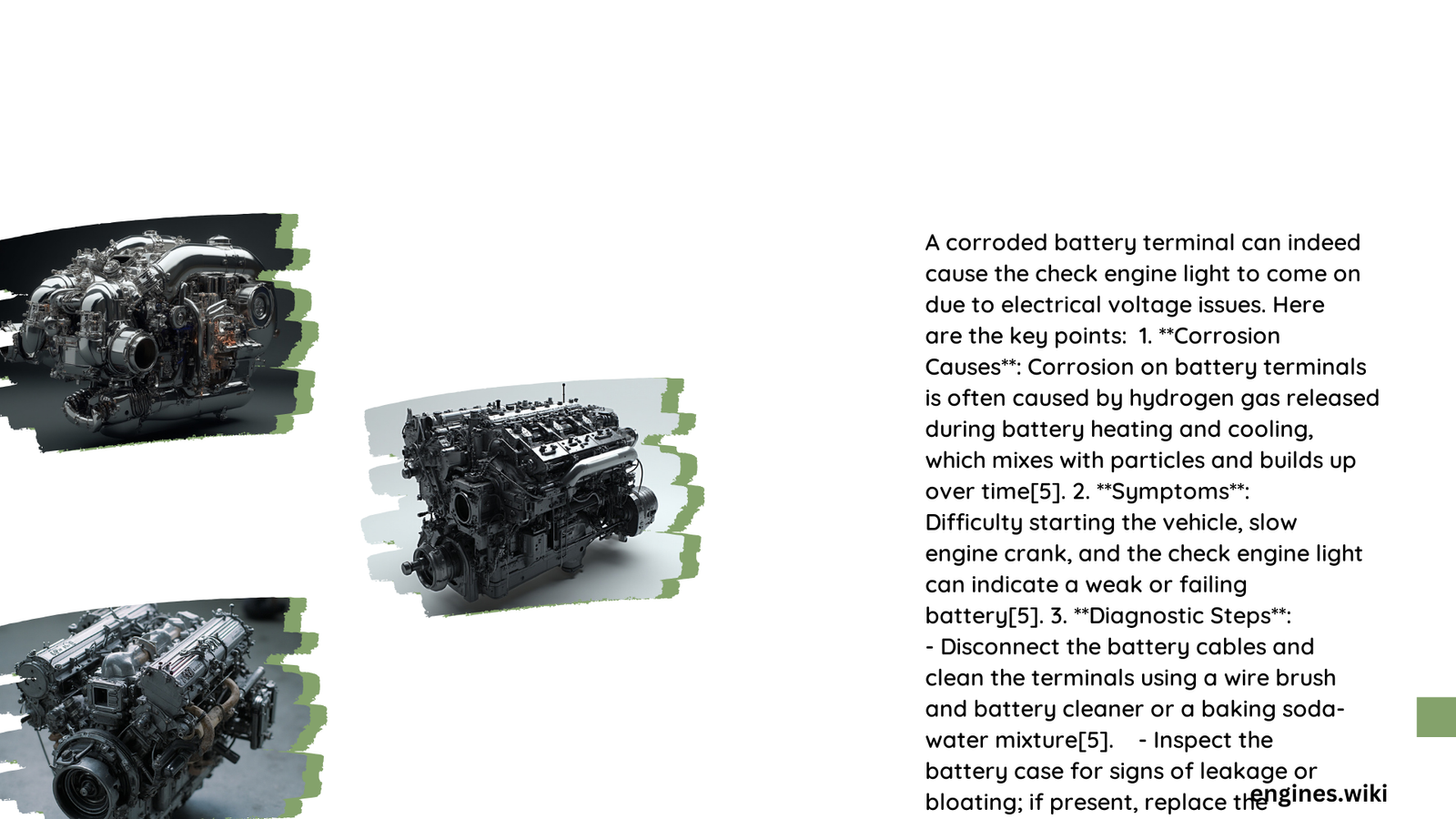Corroded battery terminals can trigger a check engine light, causing various electrical issues in your vehicle. This problem occurs when corrosion builds up on battery terminals, reducing electrical conductivity and affecting multiple vehicle systems. Understanding the symptoms, causes, and solutions for corroded battery terminals is crucial for maintaining your vehicle’s performance and preventing potential long-term damage.
What Are the Symptoms of a Corroded Battery Terminal That Can Trigger a Check Engine Light?
Corroded battery terminals can manifest in various ways, often triggering the check engine light due to electrical system disruptions. Here are some key symptoms to watch out for:
Diagnostic Trouble Codes (DTCs)
Several DTCs can be associated with corroded battery terminals:
- P1298: Electrical Load Detector (ELD) High Input
- P0335: Crankshaft Position Sensor Circuit Malfunction
- P0607: Control Module Performance
These codes often indicate broader electrical system issues, which can be caused by poor connections due to corrosion on battery terminals.
Voltage Readings
Corrosion can lead to abnormal voltage readings:
- Starting Voltage: Should be around 12.6V when not in use, dropping to 10-11V during starting.
- Charging Voltage: Should be 13.5-14.5V when the engine is running.
Corrosion can cause voltage drops or prevent proper recovery after starting.
What Are the Primary Causes of the Check Engine Light Related to Corroded Battery Terminals?

Understanding the causes of battery terminal corrosion can help prevent future issues:
How Does Corrosion Affect Electrical Conductivity?
Corrosion impacts electrical conductivity in several ways:
- Hydrogen Gas Leakage: Reacts with atmospheric particles to form corrosion.
- Electrolyte Leakage: Accumulates on terminals, causing corrosion.
- Copper Sulfate Formation: Forms a poor conductor of electricity on copper terminals.
What Is the Impact on Vehicle Sensors and Systems?
Corrosion can affect various vehicle systems:
- Starting System: Causes slow engine cranking or failure to start.
- Sensors and Modules: Leads to faulty readings, triggering DTCs.
- Alternator Charging: Disrupts the charging process, causing battery issues.
How Can You Clean Corroded Battery Terminals?
Proper cleaning of corroded battery terminals is essential to restore proper electrical connections:
What Are the Recommended Cleaning Solutions and Tools?
Choose from these effective cleaning methods:
- Battery Cleaner and Wire Brush: Ideal for breaking down and removing corrosion.
- Baking Soda-Water Mixture and Toothbrush: A DIY approach for mild corrosion.
What Safety Precautions Should You Take?
Follow these safety measures:
- Disconnect battery cables before cleaning.
- Wear protective gloves and safety glasses.
How Long Does the Cleaning Process Take?
The cleaning process typically takes 15-30 minutes, depending on corrosion severity.
How Does Battery Terminal Corrosion Affect Vehicle Performance?
Corrosion can have significant impacts on your vehicle’s performance:
What Is the Effect on Starting Power?
Corrosion can severely reduce starting power, leading to:
- Slow engine cranking
- Failure to start the vehicle
Does It Affect Fuel Efficiency?
While corrosion doesn’t directly impact fuel efficiency, it can indirectly affect it:
- A weak battery increases load on the alternator
- This may slightly decrease fuel efficiency over time
What Are the Potential Long-Term Damages?
Ignoring corrosion can lead to:
- Damage to the electrical system
- Increased repair costs
- Need for component replacements (battery, alternator, etc.)
How Can You Prevent Battery Terminal Corrosion?
Preventing corrosion is key to maintaining your vehicle’s electrical system:
- Regular inspections of battery terminals
- Applying a protective coating to terminals
- Keeping the battery clean and dry
- Ensuring proper battery charging
When Should You Seek Professional Help for Corroded Battery Terminals?
Consider professional help in these situations:
- Persistent check engine light after cleaning
- Severe corrosion that’s difficult to remove
- Electrical issues that persist after cleaning
- Lack of proper tools or expertise for cleaning
By understanding the causes, symptoms, and solutions for corroded battery terminals, you can effectively address this issue and prevent the check engine light from illuminating due to this problem. Regular maintenance and prompt attention to corrosion can save you from costly repairs and ensure your vehicle’s optimal performance.
